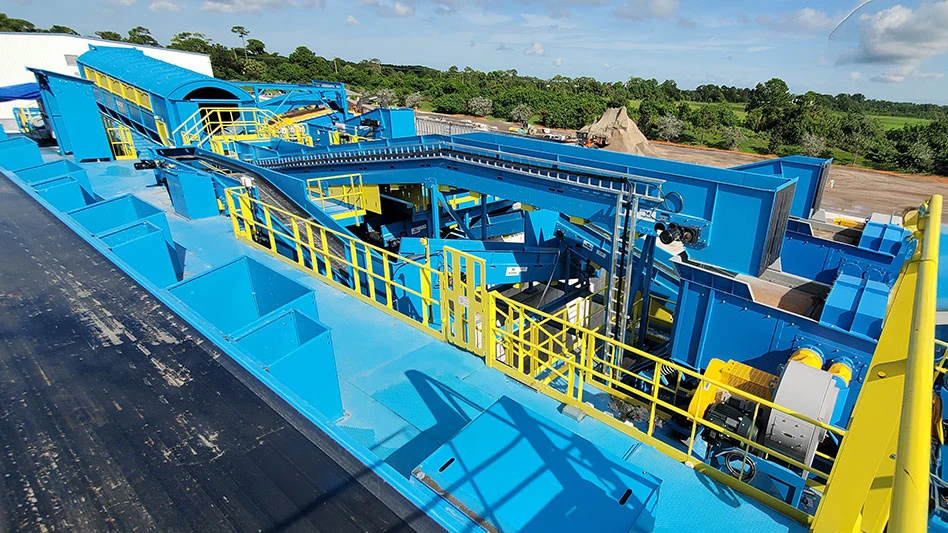It was 2001 and Daniel Bruce was ready to escape the world of advertising. He had quit his job with an agency in San Francisco and was about to begin traveling the world when his father, Gary, called with a proposition.
Gary offered Dan the chance to come back to Pennsylvania to help develop a limestone mine that the family owns in East Brady, Pa. Gary wanted a response that night, and Dan decided to cut his travels short and move back to Pennsylvania to join his dad in business.
Vital Statistics Underground Archives operates record centers that are housed in former limestone mines. The company has locations in Wampum and East Brady, Pa. Underground Archives President Daniel Bruce (pictured at left) says his facilities offer a number of benefits compared to above-the-ground records storage facilities, including protection from natural disasters and fires and a high level of security. The facilities are highly climate controlled, he says, and can be easily adapted to a client’s needs. Because the subterranean environment is relatively stable in terms of temperature and humidity, Bruce says Underground Archives can compete favorably against above-ground facilities on price. Gateway Commerce Center/Underground Archives Owner: Surface Land: Subsurface Total: Underground Depth: Ceiling Height: Business Units: Brady’s Bend Underground Storage/Underground Archives Owner: Surface Land: Subsurface Total: Underground Depth: Ceiling Height: Business Units:
While Brady’s Bend Corp., the company Dan joined as president, is primarily in the business of real estate development, Dan began his own business venture at the facility. He decided to open a records storage facility at the site, having become acquainted with the industry when his father, who also owns an electrical contracting business, became a stockholder in National Underground Storage, which operated a facility in western Pennsylvania.
In addition to records management, the Brady’s Bend facility consists of many business units, including vehicle storage and self-storage. Brady’s Bend Corp. will construct space to meet the needs of corporate and government clients at the facility.
In 2005, Bruce-Wish Management LP, a partnership among Dan, Gary and Michael Wish, acquired the Gateway Commerce Center in Wampum, Pa. Dan further developed an existing records center at that site, which is also a former limestone mine, changing the records storage division’s name to Underground Archives.
In addition to the records storage business division, Gateway Commerce Center includes business units in real estate development, third-party logistics, private warehousing and vehicle storage.
GOING UNDERGROUND
Dan began building the records storage business with the help of Matt Iezzi, a salesman who had worked with the national information management firm Iron Mountain. "It was him out on the road and me in a dark hole," Dan jokes.
In reality, the Underground Archives facilities at Brady’s Bend and Gateway Commerce Center are well lit, with bright white limestone walls and 30-foot diameter pillars throughout. Being subterranean, the facilities have an ambient temperature of 55 degrees, but buildings within the facilities generally are climate controlled to 62 degrees with a relative humidity of 50 percent. Dan says Underground Archives can easily alter the temperature and humidity to meet its clients’ requirements.
Underground Archives is different from many traditional records storage facilities, which might have a service radius of 100 to 200 miles, Dan says. "Everything we do is highly climate controlled with exacting standards for relative humidity as well as temperature. We can change those settings to whatever the customer might need," he says. "We are giving the customer a product that is far superior to anything they are going to get in somebody else’s warehouse, and we can do it at a price that is competitive with anyone above ground." He also points out that Underground Archives’ subterranean location removes the risk of natural disasters that could affect above-the-ground records centers.
Dan continues, "We have the best product out there for an incredible value." With their solid stone walls and fire-rated doors, he says, "Every room we have would be considered a vault anywhere else in the world."
Underground Archives has reduced energy consumption costs compared to other records storage companies because it doesn’t have to deal with the broad temperature fluctuations many other facilities may encounter, which requires their climate control systems to work harder, Dan says. "So we are able to give better value to our customers," he says. "It also allows us to compete for national business when you are talking about archival things, such as film or video, photography or historical documents." He continues, "You can’t charge people $2 or $3 a cubic foot for film and ask them to move it across the country for $4,000 per truckload. It just doesn’t make sense. But when you can have a realistic cost and a great product, people are willing to do it."
The company is pursuing opportunities in archival and nuclear records storage, and Dan identifies these specialty markets as areas of growth for Underground Archives.
While Underground Archives is pursuing specialty storage accounts, the company’s business is rooted in local clients, particularly those in the medical field. "Our basis was in the medical field; that’s where our concentration started. Now we are branching out into the national market," Dan says.
Underground Archives serves a number of local clients in the health care industry, such as hospitals, urgent care facilities and elderly care facilities. "Medical is the most active segment we have. We cover over a 100-mile radius for active records daily. We can go all the way to Cleveland without a problem," he says. Underground Archives also serves the western half of Pennsylvania.
GETTING PERSONAL
Dan describes Underground Archives as "small enough to care and large enough to handle all of its customers’ needs." He says, "We are a service company, not a commodity. You need to treat every customer like he is a king; it doesn’t matter if he has five boxes or 500,000 boxes."
Pegged for Growth Daniel Bruce, president of Underground Archives, with locations in East Brady and Wampum, Pa., credits much of his success in the records storage industry to the experience he gained though a profit enhancement group (PEG) managed by Management Growth Institute Inc. (MGI), Rochester, N.Y. MGI says its PEGs "bring business owners together in the same industry to drive profit and performance up." Through the PEG, Dan says he was able to develop relationships with other records center owners in different parts of the country, visit their facilities and learn from their experiences in the industry. "You can read as much as you want, but until you see it in practice, some things don’t click," he says. "It gives you an intimate knowledge and understanding of someone’s business," Dan says of the PEG. "Then they come to your business and tell you what you are doing right and wrong." He adds, "We wouldn’t be the company we are today if someone wasn’t willing to teach me."
Unlike larger records storage firms in the area, he says Underground Archives specializes in providing a personal touch. "We are a family-owned business and we are going to remain that way," he says. "There is no impersonal feel here. Every customer has my cell phone number and my partner’s. We are always available."
Dan says he believes local clients want to deal with local vendors for their business services and this gives Underground Archives an advantage in the greater Pittsburgh area. "We are the only local, family-owned records storage business."
The recession also has helped to drive clients to Underground Archives, he says. "Companies are seeing the value of storing their records off site with a premier storage facility," Dan says. And he sees another niche for the company pursuing the smaller health care facilities that may have been unvended previously. "The smaller facilities, like elderly care facilities and doctors’ offices, are not necessarily vended. Most larger companies won’t go after them; they are not worth it," he says. "These are great prospects for us, and we are helping the community too."
Dan continues, "Records storage is everyone’s last concern until it is their most important concern. It’s hard for individual businesses to do it cost effectively and keep controls and safeguards in place."
MEETING CHALLENGES
Taking Underground Archives from a fledgling local business to a records center with national accounts has required Dan to learn when to admit he’s not the best person for the job. "You need to be working on your business, not in your business," he says. "If you are driving the forklift, you are not doing the job you are there for."
Going from an entrepreneur to a small or medium-sized business owner requires thinking differently, he says. "It changes everything you do if you want to be successful at it," he says, and that means limiting the number of hats he wears at the office.
Dan says his responsibility as the owner of Underground Archives is to step back and evaluate his company and determine its direction.
"I enjoy building things and taking things that are neglected or underutilized and turning them around," he says. "When you become larger and formalize, you can’t do those things anymore; it’s going to be your undoing."
While Dan takes credit for "starting the ball rolling," he says many other people have helped build Underground Archives into the company it is today. He credits his business partner, Michael Wish, who is in charge of business development, Operations Manager Todd Johnson, Facilities Manager Brian Eakin and Matt, who is now the national sales executive, with the company’s growth. Dan also says his father let him have complete control of Underground Archives, despite their business partnership. "He let me do whatever I wanted to. He allowed me to screw up." Dan adds, "Mistakes are the most valuable learning experiences you have."
Dan says he would like to continue to grow Underground Archives, but not at the expense of customer service. "We would like to grow and get new business, but we want to get better every day. If we become more profitable, great, but if customer service suffers as a result, that’s not good," he says. "I don’t want to do one thing at the expense of another."
The author is editor of SDB and can be contacted at dtoto@gie.net.
Latest from Recycling Today
- Greenwave raises revenue but loses money in Q2 2025
- Recycled steel prices hold steady
- EY says India’s need for scrap imports will continue
- Coming full circle
- Amcor, DCM introduce fertilizer packaging with 35 percent recycled content
- Comstock Metals gets closer to commissioning commercial-scale solar panel recycling facility
- Washington selects Circular Action Alliance as PRO
- Smurfit Westrock expands in Latin America





